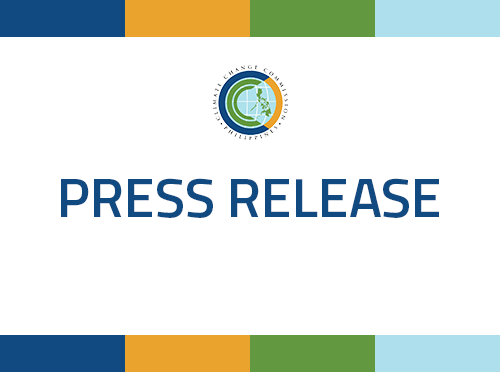MANILA, 7 June 2019 – The Climate Change Commission (CCC) reiterated its call for countries, especially the developed nations, to ramp up climate action efforts and to deliver more ambitious commitments to mitigation with utmost urgency and equity.
CCC Secretary Emmanuel M. De Guzman said the Philippines, being one of the most vulnerable countries that bear the brunt of the devastating effects of climate change, will continue to actively pursue climate action in the context of climate justice.
“We support the statement of President Rodrigo Duterte, our chairman in the Commission, that all governments must do their fair share in combating the climate crisis,” De Guzman said. “Unfortunately, global action has been slow. The Philippines has been actively pursuing climate action, but largely on our own efforts and resources. We have no choice but to act, and sometimes we have bilateral partners to thank for when they give some help. With the unrelenting impacts of climate change in our communities, we must do all we can to survive and thrive as a people and nation,” he continued.
In his visit to Tokyo, Japan earlier, President Duterte stressed in his speech that the Philippines has demonstrated leadership in global consensus to fight climate change, adding that the climate negotiations would hold and undertake real action, especially by those most responsible for this momentous problem.
“There is indeed a need for clarity of commitments by all countries on mitigation and climate finance. It’s time to raise the profile of climate issues and radically step up our efforts. We need real action and accountability from the developed countries that is primarily responsible for the climate crisis. This has been the negotiation stance of the Philippines in calling for more ambitious and faster climate action by. This has also been the essence of our fight for the 1.5oC global warming limit,” De Guzman said.
The Intergovernmental Panel on Climate Change (IPCC) special report on a 1.5 degrees warmer world released last year paints a grim scenario of the worst impacts of climate change such as the increasing risk to drought, flood, extreme heat and poverty for hundreds of millions of people. It underscores the most urgent need for rapid global action. World leaders have only 12 years to reduce greenhouse gas emissions to 45% of 2010 levels if they want to limit global warming to 1.5oC.
More than 195 countries, including the Philippines, that have ratified the United Nations Framework Convention on Climate Change are meeting annually at the Conference of Parties since 1995 to take stock of their progress, monitor the implementation of their obligations and continue talks on how best to tackle climate change. It is, therefore, important for the Philippines to participate and to be at the forefront of the international efforts to address climate change.
De Guzman explained that, in the global community, the Philippines is highly regarded as a leader of the climate vulnerable developing countries (CVF), as it championed and upheld the endeared principles on climate justice, human rights, ecosystems integrity, gender, grant-based climate finance, loss and damage, and comprehensive disaster risk management, to mention a few areas of discourse for the Paris Agreement on climate change.
“In accordance with the Paris Agreement, climate finance, capacity building, and technology transfer from the developed world must clearly come to our shore, considering that the country has been in the frontline of climate impacts,” De Guzman said.
The next round of climate talks will be held in Santiago, Chile in December where countries will work on the progress of climate action.
“All countries must exhibit leadership and deliver on commitments. Let us step up our global climate action toward securing a climate-safe future,” De Guzman said.

